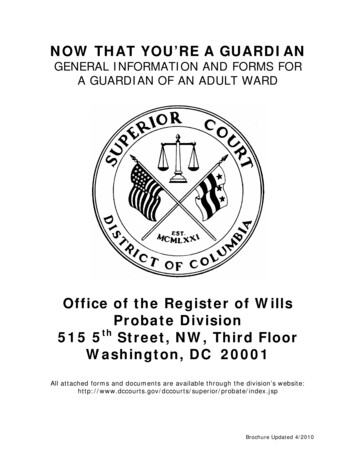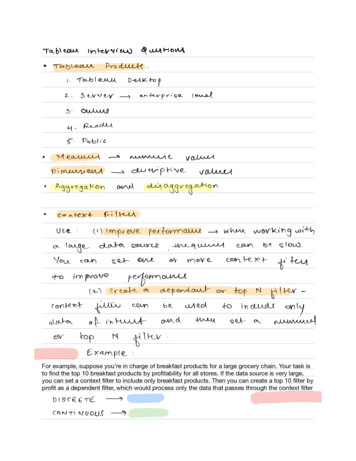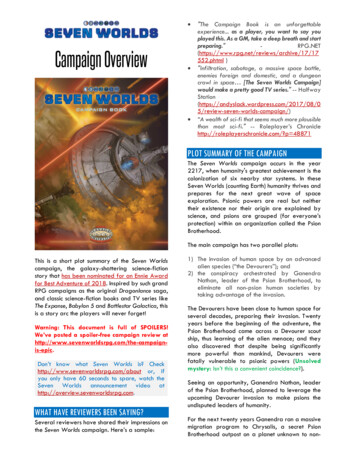
Transcription
NOW THAT YOU’RE A GUARDIANGENERAL INFORMATION AND FORMS FORA GUARDIAN OF AN ADULT WARDOffice of the Register of WillsProbate Division515 5th Street, NW, Third FloorWashington, DC 20001All attached forms and documents are available through the division’s probate/index.jspBrochure Updated 4/2010
SUPERIOR COURT OF THE DISTRICT OF COLUMBIASPECIFIC INSTRUCTIONS TO GUARDIANSUnless the appointment is made to accomplish one specific purpose, both limited andgeneral guardians shall become (or remain) personally acquainted with the ward andmaintain contact with the ward so that the guardian knows the ward’s capacities,limitations, needs, opportunities, and physical and mental health. Developing such arelationship allows the guardian to exercise the powers listed in D.C. Code, sec. 212047 for the benefit of the ward and to comply with the reporting requirements ofthat Code section. Specifically, the guardian should do the following:(1) Upon appointment, the guardian shall qualify by filing an Acceptanceand Consent to Jurisdiction (unless the guardian has signed theacceptance and consent at the end of the Petition for General Proceeding)and a bond (if the Court requires a bond). These filings must occur withinfourteen (14) days of the date of appointment.(2) For INT cases only, the guardian shall develop a guardianship plan inconsultation with the ward. That plan must be filed within ninety days ofthe date of appointment.(3) If the ward has money subject to the control of the guardian, theguardian shall ensure that money is available each month for the personaluse or incidental needs of the ward. If the ward lives in a nursing home,the guardian may consider contacting the appropriate nursing homeofficials to establish and fund a “patient’s account” with the home to beused for the monthly purchase of incidental needs of the ward. If the wardis a Medicaid recipient, the guardian shall use such amounts as areallowed by Medicaid regulations for the personal use or incidental needs ofthe ward.(4) If no conservator has been appointed and the guardian is charged withthe responsibility of expending funds for the care and maintenance of theward, the guardian shall ensure that monies available for the care andmaintenance of the ward are paid to the nursing home or other authorizedcaretaker promptly as due.(5) The guardian shall become and remain informed of the ward’s medicalneeds and desires and shall maintain sufficient contact with the ward’smedical personnel and caretakers to ensure that the medical needs of theward are satisfied fully and promptly. The guardian shall personallyvisit the ward at least once every thirty (30) days and shall file achange of address promptly if either the ward or the guardianmoves. The guardian shall seek appropriate order of the Court beforeconsenting to any medical procedures prohibited by D.C. Code, sec. 212047(c) unless the authority to consent is granted in the order ofappointment.The above instructions are for guidance only and do not include all the guardian’sduties and responsibilities. Individuals serving as guardians must comply with allapplicable statutory provisions, rules of Court, and Court orders issued regardingtheir wards.April 2010
SUPERIOR COURT OF THE DISTRICT OF COLUMBIAGUARDIANSHIP INFORMATION SHEETThe following information is provided to those individuals appointed as limited orgeneral guardian of an incapacitated individual (ward), but is not intended to be allinclusive. Individuals serving as guardians shall be governed by all applicablestatutory provisions, rules of Court, and Court orders issued regarding their wards.1. PERMANENT GENERAL GUARDIANA permanent general guardian is one appointed by the Court and on whom the Courthas conferred, without limitation, those general powers set forth in D.C. Code, sec.21-2047(a) & (b) (2001 ed.).2. PERMANENT LIMITED GUARDIAND.C. Code, sec. 21-2044(c) reads as follows:“The court, at the time of appointment, later on its own motion, or on appropriatepetition or motion of the incapacitated individual or other interested person, maylimit the powers of a guardian otherwise conferred by this chapter and create alimited guardianship. Any limitation on the statutory power of a guardian of anincapacitated individual shall be endorsed on the guardian’s letters. Following thesame procedure, a limitation may be removed or modified and appropriate lettersissued.”3. QUALIFICATIONA guardian qualifies by executing and filing an Acceptance of Guardian/Conservatorform (unless the guardian signed the acceptance at the end of the Petition for aGeneral Proceeding). If bond is required by order of Court, the guardian must alsoexecute and file a bond in the amount set by the Court to qualify. These filings mustoccur within fourteen (14) days of the date of appointment.4. POWERSUpon appointment, a guardian is responsible for the care, custody, and control of theward subject to any limitations imposed by the Court. A guardian shall become (orremain) personally acquainted with the ward and maintain contact with the ward sothat the guardian knows the ward’s capacities, limitations, needs, opportunities, andphysical and mental health. The guardian shall visit the ward at least onceevery thirty (30) days. The guardian shall exercise only those powers under D.C.Code, sec. 21-2047(a), (b), and (c) set forth in the Court’s order of appointment orauthorized by subsequent order of the Court. The powers may be found in Title 21of the D.C. Code, Chapter 20 at www.dccouncil.washington.dc.us/dcofficialcode.5. PETITIONSApplication to the court for an order after appointment shall be by the filing of averified Petition Post Appointment that includes a Notice of Hearing on SubsequentPetition pursuant to SCR-PD 311, a Notice of Right to Respond and/or Request anOral Hearing pursuant to SCR-PD 322, an order appointing counsel, and a proposedorder for the court’s signature. The petition shall state specifically what is beingrequested and why the request is being made and shall include such supplementalinformation and/or documentation as may be considered appropriate.April 2010
6. GUARDIANSHIP PLAN, REPORTS, AND CHANGE OF ADDRESS(a) Filing of Guardianship Plan - For INT cases only, the guardian shalldevelop a guardianship plan in consultation with the ward. That plan must be filedwithin ninety days of the date of appointment.(b) Filing of Reports - A guardian, limited or general, shall submit a writtenreport to the Court at least semi-annually on the condition of the ward and theward’s estate that has been subject to the guardian’s possession or control. Inaddition, if the ward moves, the guardian shall file a Praecipe – Change of Addressform promptly to notify the Court. The guardianship report shall be prepared on theReport of Guardian form and signed under oath. The first report shall be due sixmonths from the date of appointment, and successive reports shall be due at sixmonth intervals thereafter. The Court reviews these reports and is very concernedthat they be filed promptly.(c) Service – The guardianship plan, guardianship reports, and Praecipe – Changeof Address shall be served upon all parties (including the ward), upon any personwho has filed an effective request for notice, and upon other such persons as theCourt may direct.7. SUGGESTION OF DEATHUpon the death of the ward, the guardian shall file a Suggestion of Death formpromptly to notify the Court that the ward has died and must serve a copy on allparties.8. FINAL REPORT OF GUARDIANUpon the death of the ward, termination of the guardianship, orguardian, the guardian shall file a final report of guardian withunder the guardian’s control or possession within sixty (60) days.of final report of guardian shall be filed within sixty (60) daysadministered by the guardian.resignation of therespect to assetsAn affidavit in lieuif no assets were9. RECEIPTSPromptly after full distribution and settlement a guardian shall file receipts orcanceled checks evidencing final distribution of any assets held.10. ADDITIONAL INFORMATION(a) The law that applies to guardianships is D.C. Code, Title 21, Chapter 20.(b) The court rules that apply to guardianships are in the 300 Series of theSuperior Court, Probate Division Rules.(c) No attorney fees are to be paid from estate funds unless specificallyauthorized by order of court after compliance with Superior Court, Probate DivisionRule 308.(d) No guardian shall commingle any estate assets with non-estate assets(i.e., no guardian shall mix any of the ward’s assets with assets belonging to anyoneelse).(e) Guardians are hereby notified that any authority granted by thecourt to administer funds of the ward terminates upon death. Upon death ofthe ward, no further expenditures shall be made.(f) Court clerks and staff cannot give legal advice. If legal questions arise,consult an attorney. Neither the Register of Wills nor any member of her staff ispermitted to recommend lawyers. If legal help is needed, consider consulting theLawyer Referral Information Service of the D.C. Bar.April 2010
D. C. Code, §21-2047. Powers and Duties of GeneralGuardian and Limited Guardian (D.C. Code, 2001 ed., 2008suppl.)Except as limited pursuant to section 21-2044, a general guardian or a limitedguardian of an incapacitated individual is responsible for care, custody, and control ofthe ward, but is not personally liable to third persons by reason of that responsibilityfor acts of the ward.(a) In particular and without qualifying the foregoing, a general guardian orlimited guardian shall:(1) Become or remain personally acquainted with the ward andmaintain sufficient contact with the ward to know of the ward’scapacities, limitations, needs, opportunities, and physical and mentalhealth;(2) Take reasonable care of the ward’s personal effects and commenceprotective proceedings, if necessary, to protect other property of theward;(3) Apply any available money of the ward to the ward’s current needsfor support, care, habilitation, and treatment;(4) Conserve any excess money of the ward for the ward’s futureneeds, but if a conservator has been appointed for the estate of theward, the guardian, at least quarterly, shall pay to the conservatormoney of the ward to be conserved for the ward’s future needs;(5) Report in writing the condition of the ward and of the ward’s estatethat has been subject to the guardian’s possession or control, asordered by the court on petition of any person interested in the ward’swelfare or on any order of the court, but at least semi-annually;(6) Make decisions on behalf of the ward by conforming as closely aspossible to a standard of substituted judgment or, if the ward’s wishesare unknown and remain unknown after reasonable efforts to discernthem, make the decision on the basis of the ward’s best interests;(7) Include the ward in the decision-making process to the maximumextent of the ward’s ability; and(8) Encourage the ward to act on his or her own behalf whenever he orshe is able to do so, and to develop or regain capacity to makedecisions in those areas in which he or she is in need of decisionmaking assistance, to the maximum extent possible.(b) A general guardian or limited guardian may:(1) Receive money payable for the support of the ward under theterms of any statutory benefit or insurance system or any privatecontract, devise, trust, conservatorship, or custodianship;(2) Take custody of the person of the ward and establish the ward’splace of abode within or without the District, if consistent with theApril 2010
terms of any order by a court of competent jurisdiction relating todetention or commitment of the ward;(3) Institute proceedings, including administrative proceedings, or takeother appropriate action to compel the performance by any person of aduty to support the ward or to pay sums for the welfare of the ward, ifno conservator for the estate of the ward has been appointed;(4) Consent to medical examination and medical or other professionalcare, treatment, or advice for the ward, without liability, by reason ofthe consent for injury to the ward resulting from the negligence or actsof third persons, unless the guardian fails to act in good faith;(5) Obtain medical records for the purpose of applying forgovernment entitlements or private benefits and have the status of alegal representative under the District of Columbia Mental HealthInformation Act of 1978, effective March 3, 1979 (D.C. Law 2-136;Sec. 7-1201.01 et seq.); and(6) If reasonable under all of the circumstances, delegate to the wardcertain responsibilities for decisions affecting the ward’s well-being.(c) [Repealed].(d) A guardian is entitled to reasonable compensation for services as guardianand to reimbursement for room, board, and clothing personally provided tothe ward, but only as approved by order of the court pursuant to section 212060(a).(Feb 28, 1987, D.C. Law 6-204, Sec. 2(a), 34 DCR 632; May 10, 1989, D.C.Law 7-231, Sec. 27, 36 DCR 492; Sept. 22, 1989, D.C. Law 8-34, Sec. 2(h),36 DCR 5035; Oct. 22, 2008, D.C. Law 17-249, Sec. 2(g), 55 DCR 9206.)D. C. Code, §21-2047.01. Limitations on Temporary,Limited, and General Guardians (D.C. Code, 2001 ed.,2008 supplement)A guardian shall not have the power:(1) To consent to an abortion, sterilization, psycho-surgery, or removal of abodily organ except to preserve the life or prevent the immediate seriousimpairment of the physical health of the incapacitated individual, unlessthe power to consent is expressly set forth in the order of appointment orafter subsequent hearing and order of the court;(2) To consent to convulsive therapy, experimental treatment or research, orbehavior modification programs involving aversive stimuli, unless thepower to consent is expressly set forth in the order of appointment orafter subsequent hearing and order of the court;(3) To consent to the withholding of non-emergency, life-saving, medicalprocedures unless it appears that the incapacitated person would haveApril 2010
consented to the withholding of these procedures and the power toconsent is expressly set forth in the order of appointment or aftersubsequent hearing and order of the court;(4) To consent to the involuntary or voluntary civil commitment of anincapacitated individual who is alleged to be mentally ill and dangerousunder any provision or proceeding occurring under Chapter 5 of Title 21,except that a guardian may function as a petitioner for the commitmentconsistent with the requirements of Chapter 5 of Title 21 or Chapter 13 ofTitle 7;(5) To consent to the waiver of any substantive or procedural right of theincapacitated individual in any proceeding arising from an insanityacquittal; or(6) To prohibit the marriage or divorce, or consent to the termination ofparental rights, unless the power is expressly set forth in the order ofappointment or after subsequent hearing and order of the court.(Oct. 22, 2008, D.C. Law 17-249, Sec. 2(h), 55 DCR 9206.)April 2010
SUPERIOR COURT OF THE DISTRICT OF COLUMBIAPROBATE DIVISIONINTIDDIn re:An AdultGUARDIANSHIP PLANThis plan should be developed in consultation with the ward, family members whenpossible, and with input from any other community agencies involved in providingservices to the person.I am the guardian of the above named ward and my proposed plan for providingservices to the ward is as follows:Incapacity of ward (please select all that apply):Intellectual disability (e.g., MR)StrokeChronic mental illnessHead injuryDementia (e.g., Alzheimer’s)Alcohol/substance abuseMedical condition (describe):Other:I. Living Arrangements for the WardWhat is the current address of the ward’s residence?This is aPrivate home, owned by wardPrivate home, not owned by wardGuardian’s homeRelative’s home (relationship)Foster or boarding homeGroup home (insert name)Nursing home (insert name)Assisted living facility (insert name)Hospital or medical facility (insert name)Other (please specify):If private home, please name any other persons living in the home and theirrelationship to the ward:Continue to live at current residenceChangeMy plan is for the ward to:residenceIf changing residence, explain when, why and where ward will move:April 20101
I do not have enough information at this time to change the ward’s current livingarrangement.I have discussed the housing plan with the ward, and the wardagrees with this plandoes not agree with this planI have not discussed the housing plan with the ward because:II. Medical Care for the WardDescribe the current physical health of the ward, including all known healthconditions for which treatment is being received or is proposed:I do not have enough information at this time to determine the ward’s medicalneeds.I plan to continue the medical services currently provided for the ward (providename of health care professionals):Physician:Psychiatrist or psychologist:Social Worker or other case worker:Dentist:Podiatrist:Dietician:Therapist(s) (recreation, speech, physical, occupational):Other:I plan to seek a medical evaluation of the ward to determine the following:I believe the ward does not currently need treatment for any medical problems.Does the ward have a health care directive?YesNo, please explain:In the absence of a health care directive, what efforts have you made to determinethe ward’s preferred medical treatment?April 20102
III.Mental Health Treatment for the WardDescribe the current mental health of the ward, including all known diagnoses madeby mental health professionals for which treatment is being received or is proposed:I do not have enough information at this time to determine the ward’s mentalhealth treatment needs.I plan to continue the mental health services currently provided for the ward(provide name of health care professionals):Psychiatrist or psychologist:Social Worker or other case worker:Other:I plan to seek a mental health evaluation of the ward to determine the following:I believe the ward does not currently need mental health treatment.IV. Social and Supportive Care for the WardDescribe the ward’s current social activities and support services:Is the ward currently employed?YesNoIf yes, provide details:Is the ward currently participating in any educational, vocational or other training?YesNoIf yes, provide details:In the next year, I plan to arrange the following services to assist the ward:Educational or training programsVocational rehabilitation or supported work programsMedical treatment, operation, or procedureMental health treatmentOccupational, physical, or speech therapyPersonal home care (e.g., home health aide)Case management or social work servicesHousing assistance and/or public benefitsAssistive devices or accommodationOther (please specify):V. Financial Care for the WardDo you have control over any assets or funds of the ward?April 20103NoYes
I plan to investigate whether the ward has any type of insurance and whether theward is eligible for any private benefits or government entitlements, including thefollowing:Pension and/or income from employmentOther benefits from past employersSocial security benefits (disability, SSI, SSA retirement, SSA survivor benefits)Veteran’s benefitsState benefits (food stamps, public assistance, TANF)Medicaid or Medicaid waiverMedicareBurial and funeral assistanceOther:I do not plan to investigate because a conservator has been appointed.I do not plan to investigate becauseVI. Other InformationDoes the ward have a prepaid funeral plan?(copy will be kept in a confidential file)NoYes, attach copy if not previously filedI don’t know, please explain:Does the ward have a will?I don’t know, please explain:YesNoPlease provide the names and addresses of the ward’s next of kin:Spouse/domestic partnerChildrenGrandchildrenParentsBrothers and/or sistersContinue listing relatives below if no relatives are listed above.Nieces and/or nephewsUncles and/or auntsFirst co
NOW THAT YOU’RE A GUARDIAN . GENERAL INFORMATION AND FORMS FOR . A GUARDIAN OF AN ADULT WARD . Office of the Register of Wills Probate Division . 515 5th Street











